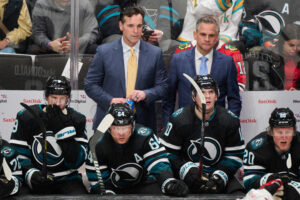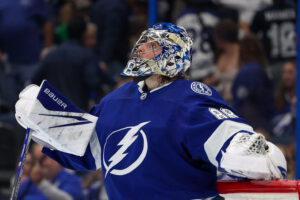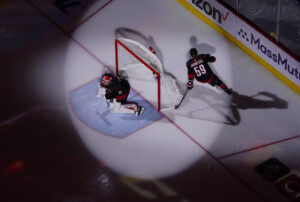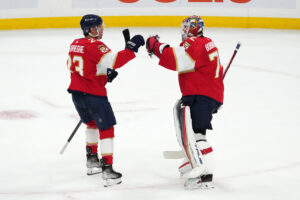The Franchise Best Series comes to you to dive into the all-time best single season for every organization. This, of course, includes post-season results. Join us for a look back at some of the most memorable moments in each franchise’s history. Here is the Philadelphia Flyers best season.
Philadelphia Flyers 1974-75 Season
Previous Year and Off-Season
The 1973-74 Philadelphia Flyers had a fantastic season. The team won 50 games and collected 112 points. The Flyers continued their strong play into the playoffs advancing to their first Stanley Cup final. In the final, they met the heavily favoured Boston Bruins. Even though the Bruins only finished one point better than the Flyers, the Bruins were expected to win the series. The Bruins were led by Bobby Orr, Phil Esposito and Ken Hodge; all topped 100 points in the regular season.
Unphased, the Flyers dispatched the “Big, Bad” Bruins in six games to win their first Stanley Cup. It was also the first Cup won by an expansion team. After knocking around the Bruins, and the league, to win their Cup, the Broadstreet Bullies were born. Bernie Parent won the Conn Smyth and the Vezina Trophy. Coach Ray Shero won the Jack Adams trophy and Bobby Clarke was awarded the Lester B. Pearson trophy.
In the off-season, the Flyers made a trade to acquire Reggie Leach from the California Golden Seals. The Riverton Rifle acquisition gave the Flyers more scoring depth in their quest to repeat as Stanley Cup Champions.
Regular Season
The 1974-75 Philadelphia Flyers were on a mission to prove they were more than a one-hit wonder. Their mission would lead them on a dominant season. The Flyers would finish as the best team in the NHL, with 113 points and 51 wins. They the leagues stingiest defence, surrendering only 181 goals against. the Flyers were especially tough to play against at the Spectrom. The team posted a 32-6-2 home record. The Flyers tendency to intimidate and bully their opponents created an extremely hostile home environment. The Flyers were dominant most of the season, but the team did slump through February, posting a 5-7-2 record. Still, the team bounced back in March and April, posting a 15-1-2 record to close out the season.
The Flyers were led by their captain Bobby Clarke. Clarke would score 27 goals and 116 points en route to his second Hart trophy in three years. Clarke was far and away the leader of the team, but the Flyers had tremendous depth. Rick MacLeish would finished second in team scoring with 38 goals and 79 points. The newly acquired Reggie Leach would lead the team in goal scoring with 45 goals. Bill Barber would also contribute 34 goals and 71 points. In goal, Bernie Parent had another phenomenal season for the Flyers. He posted a 44-14-9 record with 12 shutouts. He had a 2.03 goals against average and a .919 save percentage. Parent would take home his second consecutive Vezina Trophy. With the Broadstreet Bullys at the height of their powers, it’s no surprise that Dave Schultz set an NHL record for penalty minutes with 472.
The Playoffs
Quarterfinals
In their opening round playoff series, the Flyers would play the Toronto Maple Leafs. The Leafs were riding high after their first-round upset over the Los Angeles Kings. Unphased, the Flyers put the boots to the Leafs and swept them. Philadelphia smothered the Leafs, only allowing six goals in the four games. Parent was dominant in the series, posting two shutouts in the four games.
It was game one that set the tone for the series. After the Flyers took a 2-0 first-period lead on two Rick MacLeish goals, the Leafs came to life in the second. They scored three power play goals to take a lead into the third. Unphased, the Flyers score three goals in under three minutes in the third period to put the game away. The Flyers would post back to back shutouts of Toronto in games two (3-0) and three (2-0). Game four needed overtime, but the Leafs were no match and the Flyers won to advance to the semifinals.
Semifinal
The Flyers would face the New York Islanders in the semifinal matchup. The Islanders were riding high after making their first-ever playoff appearance. Along the way, the Islanders made history. In their quarterfinal matchup with the Pittsburgh Penguins, the Islanders became the second North American team to win a best-of-seven series after losing the first three games.
In the series, the Flyers looked to make quick work of the inexperienced Islanders. At first glance, it looked like that is exactly what was going to happen. The Flyers dominated New York in game one 4-0 to draw first blood. Game two was a decidedly closer affair. The Flyers jumped out to an early 4-1 second-period lead. The Islanders chipped away and eventually tied the game in the third period to force overtime. Bobby Clarke would score the overtime winner, however, to give the Flyers a 2-0 series lead. Game three was an extremely tight affair. Only a Reggie Leach goal, 30 seconds into the third period separated the teams. It also gave the Flyers a 3-0 series lead.
History Repeating?
Game four was another close game. The Islanders played as if their backs were against the wall, and took 2-0 and 3-1 leads but could not put the Flyers away. Rick MacLeish would tie the game in the third period to send it into overtime. This time, however, the Islanders would prevail on a Jude Drouin goal to send the series back to Philadelphia. While the smart money was on the Flyers closing the series out at the hostile Spectrom, the Islanders had other ideas. They jumped on the Flyers and won the game 5-1. Game six was a tight affair that the Islanders would win 2-1.
The series was now tied 3-3. Could the Islanders win back to back series after falling behind 3-0? Unfortunately for Islanders fans, the answer is no. The Flyers would avoid the embarrassment by defeating the Islanders 4-1 in game seven to advance to their second consecutive Stanley Cup final.
Stanley Cup Final
The Flyers would face the Buffalo Sabres in the Stanley Cup final. It was the first meeting between two non-Original Six teams in NHL history. The Sabres were also the first post-1967 expansion team to reach the final. It was also a matchup of the two best teams during the regular season. The Sabres posed an offensive threat to the Flyers. Leading the way was the French connection line of Rick Martin, Gilbert Perreault and René Robert. The Flyers would need to be at their defensive best in the series.
Game one was a cagey affair. There was no scoring through two periods. The Flyers got on the board first with notching two third period goals. Richard Martin responded for the Sabres on the power play to make the score 2-1. Bobby Clarke would score 34 seconds later to restore the two-goal lead. The Flyers would win 4-1. Game two was another tight affair, with the Flyers topping the Sabres 2-1 on a Bobby Clarke third period goal.
The Fog and The Bat
Game three of the series would become on the most famous games in NHL history. Unseasonably warm weather, coupled with the Aud not having air conditioning caused the game to be played in a fog. The game would come to be known as the “Fog Game”. Just to add a little bit more craziness to the game, there was also a bat on the lose during the game. The bat was flying close to the ice and in the crowd. In the second period, Sabres player Jim Lorentz would take matters into his own hands and take the bat out. In somewhat of an afterthought, the Sabers would win the game 5-4 in overtime to pull back into the series. The Sabres carried that momentum into game four and win the game 4-2 to tie the series.
Returning home, the Flyers would feed off the home crowd and dominate the Sabres 5-1 to take a 3-2 series lead. Back in Buffalo, the Sabres tried everything to force a game seven. Bernie Parent had other ideas. He stiffled the Sabres at every turn. The Flyers would win the game 2-0 and claim their second consecutive Stanley Cup.
End Result
The Flyers won their second consecutive Stanley Cup. Bernie Parent became the first player to claim back-to-back Conn Smythe trophies. Parent lomed extremely large for the Flyers, especially in the Finals as he held the high flying Sabres to 12 goals in the six games. The Flyers seemed poised to become the next NHL dynasty.
They’re Going Home!
Unfortunately for the Flyers, it was not to be. The following year the Flyers again ran roughshod through the NHL. The season was marked by Super Series ’76. The Soviet Red Army team would play four games against NHL teams. The Flyers would be the only team to win, but the game was marked by the Red Army leaving the ice in protest to the Flyers violent style. Only after the threat of losing their pay for the entire series did the Red Army return. The Flyers won the game 4-1.
1975-76 Flyers were still a force, racking up 118 points. Bobby Clarke would win his third Hart Trophy and Reggie Leach would lead the league in goal scoring with 61 goals. The Flyers would advance to their third consecutive Stanley Cup final, this time to face the Montreal Canadiens. Unfortunately for the Flyers, they were swept by the Habs en route to four Cups in a row.
The Flyers would continue to be a contending team, but would only return to the finals in 1980. Since their last Cup, the Flyers seemed to have a knack for running into the dominant dynasties once they make the finals. 1976 against the Canadiens. 1980 against the Islanders. 1985 and 1987 against the Oilers. 1997 against the Red Wings. 2010 against the Chicago Blackhawks. While the Flyers have been able to produce several strong and competitive teams since 1975, they have never been able to recapture the ultimate glory of that team.






